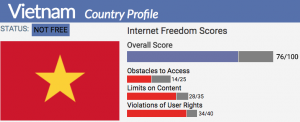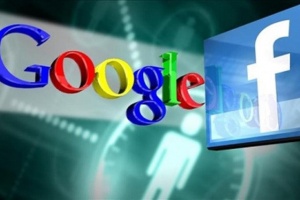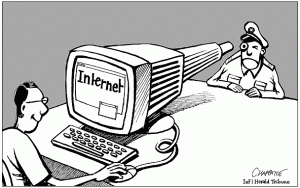Difference between revisions of "Cybersecurity Law in Vietnam"
| Line 28: | Line 28: | ||
=== Anonymity === | === Anonymity === | ||
The government’s requirement that online service providers must collect excessive amounts of data on users greatly limits an individual’s capacity to be anonymous online. So much data is collected about a user's actions and relationships, that, if coordinated, can easily result in identifiability.<ref name="floridi">“Privacy - Informational Friction .” The 4th Revolution: How the Infosphere Is Reshaping Human Reality, by Luciano Floridi, Oxford University Press, 2016. </ref> When examined individually, a user’s actions can be difficult to trace back to them. However, when grouped together, these actions can reveal identifying characteristics about the user.<ref name="floridi">“Privacy - Informational Friction .” The 4th Revolution: How the Infosphere Is Reshaping Human Reality, by Luciano Floridi, Oxford University Press, 2016. </ref> Moreover, in time a pattern may form from a user’s online activity, which can particularly reveal personal details about their life. By using sophisticated data analysis tactics, the government can identity their citizens who do not conform to their preferred beliefs and standards. Anonymity provides safety, freedom, and security. Users value anonymity as a means of maintaining privacy and the Cybersecurity law restricts this ability. | The government’s requirement that online service providers must collect excessive amounts of data on users greatly limits an individual’s capacity to be anonymous online. So much data is collected about a user's actions and relationships, that, if coordinated, can easily result in identifiability.<ref name="floridi">“Privacy - Informational Friction .” The 4th Revolution: How the Infosphere Is Reshaping Human Reality, by Luciano Floridi, Oxford University Press, 2016. </ref> When examined individually, a user’s actions can be difficult to trace back to them. However, when grouped together, these actions can reveal identifying characteristics about the user.<ref name="floridi">“Privacy - Informational Friction .” The 4th Revolution: How the Infosphere Is Reshaping Human Reality, by Luciano Floridi, Oxford University Press, 2016. </ref> Moreover, in time a pattern may form from a user’s online activity, which can particularly reveal personal details about their life. By using sophisticated data analysis tactics, the government can identity their citizens who do not conform to their preferred beliefs and standards. Anonymity provides safety, freedom, and security. Users value anonymity as a means of maintaining privacy and the Cybersecurity law restricts this ability. | ||
| + | |||
| + | ===Freedom of Speech and Expression=== | ||
| + | Similar to anonymity providing freedom on the internet, the cybersecurity laws in Vietnam extremely limit citizens ability to speak freely within Vietnam. While the new laws are supposed to suppress the risk of cyber threats to critical services of the Vietnamese governments and minimize cyber terrorism, the deterioration of freedom of expression is more detrimental. In reality, the government asks social media networks to erase all signs of political dissent online and restrict the ability of users to publicly announce their opinions online. <ref>"To The Dismay Of Free Speech Advocates, Vietnam Rolls Out Controversial Cyber Law" NPR. January 1 2019. https://www.npr.org/2019/01/01/681373274/to-the-dismay-of-free-speech-advocates-vietnam-rolls-out-controversial-cyber-law </ref>. In response to this, the United States social media giants such as Facebook and Google, who must open offices in Vietnam and store local user data to comply with the new laws, have not spoken out about the implication on freedom of speech. They have received criticism for not doing so as they have reason to be cautious because of public backlash and because Vietnam is currently the #7 most popular country to use Facebook. <ref>McLaughlin, Timothy. "Under Vietnam’s new cybersecurity law, U.S. tech giants face stricter censorship." Washington Post. March 16 2019. https://www.washingtonpost.com/world/asia_pacific/under-vietnams-new-cybersecurity-law-us-tech-giants-face-stricter-censorship/2019/03/16/8259cfae-3c24-11e9-a06c-3ec8ed509d15_story.html?utm_term=.64cb1f7cd1e0 </ref>. | ||
=== Policy Across Borders === | === Policy Across Borders === | ||
Revision as of 13:00, 22 April 2019
The Cybersecurity Law was revolutionarily instituted by the Vietnamese National Assembly on January 1, 2019.[1] The new law imposes extreme restrictions on user freedoms online in hopes of preventing cyber crimes. Defaming the government, spreading false information, and promoting radical ideas online about the government must be removed immediately.[2]. Moreover, social media companies and other online services have to comply with new data-localization guidelines, which require them to collect Vietnamese user data, and to report the data to authorities when requested.[1] The implementation of the Cybersecurity Law has caused significant backlash from online service providers and the Vietnamese people for infringing upon the privacy rights of Vietnam's citizens. The lack of privacy limits one's anonymity online and gives people the sense they are being surveilled.
Contents
Internet Censorship In Vietnam
Nearly 54% of Vietnam's population is online, despite the country's strict internet regulationslegislated in 2013.[3] Vietnam uses a combination of firewalls, controls, and other forms of censorship on the internet to limit anti-government propaganda and other harmful behavior.[4]
Many websites containing information about democracy and other forms of freedom are blocked. Whenever deemed necessary, authorities can control the access citizens have to the internet. Their efforts are not only limited to technical controls; Vietnam implements legislation and provides education that furthers their security intentions.[5]. The rigidness of Vietnam’s internet censorship follows similar patterns to those of its neighbor, China. Punishments for not complying to Vietnam's internet standards include internet restriction, blockage from telecommunication networks, or, worse, jail-time.
Social Media Companies
Prohibited Content
More than half of Vietnam’s population are social media users. The most popular social media sites in Vietnam are Facebook, YouTube, and Google.[6] The main attraction of social media is the absence of govenment regulation, making it one of the few platforms for activists to express their dissents. The new Cybersecurity law requires social media companies to remove or block any information considered toxic by the government within 24 hours, as instructed by the authorities.[2] Most prohibited content denounces the Vietnam regime or promotes radical ideas. In 2017, prior to the law, Google had to remove over 6000 YouTube videos,[6] leading authorities to ask Facebook to remove hundreds of accounts. Other blogging or messaging platforms were also prohibited throughout Vietnam, and bloggers have even been arrested for stating their views openly online.
Data Localization Policies
The Cybersecurity law also requires prominent social media companies such as Facebook and Google to build offices in Vietnam to provide local data storage.[6] Currently, both companies serve Vietnam from their offices in Singapore. The data localization policy specifies that social media companies must collect personal data on users that are Vietnamese citizens. Authorities may also require companies to store information including a user's name, contact information, relationships, or online activities. The government can also force companies to store even more invasive data, such as a user's job title, medical records, and address.[1] This information must be surrendered to the government when requested. The Cybersecurity law also states that the government determines how long social media companies must store this data. Some social media companies believe the new data localization policies are a privacy violation, because they have to choose between complying to the cybersecurity law or following their own terms of service, which are generally much more open.[1]
Vietnamese Citizens
The actions of Vietnamese citizens are closely surveilled and monitored online. Any offensive commentary posted about the Vietnam regime can be subject to punishment under the Cybersecurity law. Previously, online forums and blogs were one of the only ways for Vietnamese activists to spread their beliefs to a large audience. Radical bloggers and activists were still occasionally given harsh prison sentences for posting slander online, but there were no clear legislative policies. Blogger Hoang Duc Binh had received the longest sentence to date and suffered 14 years in prison.[2]. Under the new law, any blogger caught making an offensive comment online can be convicted of a crime or restricted internet access. The punishment for the crime varies based on the severity of the statement. The government implemented a 10,000 person military unit to regulate offensive content online.[2] The government’s ability to manipulate the information posted by a Vietnamese citizen can be seen as an unauthorized invasion of personal information, and thus a breach of privacy, according to Floridi and many others.[7] The government shows no respect to this type of privacy, especially in regard to non-conforming opinions and commentary.
Ethical Implications
Surveillance
Across the world, Vietnam's cybersecurity law has been denounced repeatedly for its absence of privacy protection for the Vietnamese people. Many critics argue the law exhibits zero regard for privacy on the internet, and has destructive outcomes for freedom of expression.[8] Every act by citizens and online service providers is closely monitored and scrutinized. Constant surveillance in a public space produces ambiguity on who is monitoring actions and when.[9] Surveillance creates a significant loss of freedom because it changes a person’s experience in that space, as they self-censor. This has devastating consequences for privacy because a person’s sense of self-ownership is restricted, which affects their identity.[9] Communities online used to be the only way to escape from Vietnam’s oppressive climate, but now even this outlet is tainted. Many believe the Cybersecurity law is solely to protect the government’s monopoly, rather than for its stated purpose for cyber security.[8]
Anonymity
The government’s requirement that online service providers must collect excessive amounts of data on users greatly limits an individual’s capacity to be anonymous online. So much data is collected about a user's actions and relationships, that, if coordinated, can easily result in identifiability.[7] When examined individually, a user’s actions can be difficult to trace back to them. However, when grouped together, these actions can reveal identifying characteristics about the user.[7] Moreover, in time a pattern may form from a user’s online activity, which can particularly reveal personal details about their life. By using sophisticated data analysis tactics, the government can identity their citizens who do not conform to their preferred beliefs and standards. Anonymity provides safety, freedom, and security. Users value anonymity as a means of maintaining privacy and the Cybersecurity law restricts this ability.
Freedom of Speech and Expression
Similar to anonymity providing freedom on the internet, the cybersecurity laws in Vietnam extremely limit citizens ability to speak freely within Vietnam. While the new laws are supposed to suppress the risk of cyber threats to critical services of the Vietnamese governments and minimize cyber terrorism, the deterioration of freedom of expression is more detrimental. In reality, the government asks social media networks to erase all signs of political dissent online and restrict the ability of users to publicly announce their opinions online. [10]. In response to this, the United States social media giants such as Facebook and Google, who must open offices in Vietnam and store local user data to comply with the new laws, have not spoken out about the implication on freedom of speech. They have received criticism for not doing so as they have reason to be cautious because of public backlash and because Vietnam is currently the #7 most popular country to use Facebook. [11].
Policy Across Borders
In the past, inconsistent legislation and regulations surrounding internet conduct across different countries has led to a number of complicated ethical questions. Without a global standard to define the ethical principles of internet use across borders, it can be difficult to negotiate the laws and regulations between conflicting ideologies of two or more countries. Recently, a group of individuals formed to define a code of ethics for Google's "right to be forgotten" policy. [12] Luciano Floridi, one of the members of the board that Google constructed, wrote an article on the ethical issues that were confronted in their discussion. [12] One of the issues mentioned in his article and that the board confronted early on dealt with how policies regarding what justifies a valid delink request should translate across borders. In the future, a similar issue of how differing policies may be handled in Vietnam's relations with countries may prove to be a difficult problem to solve.
Bias in Information
The removal of content that defames the government, spreads false information, or promotes radical ideas prevents individuals from accessing any information against the Vietnamese government. This lack of information access creates a bias in information[13]. Taking down articles that speak against the government in any capacity removes the individual’s right to have access to this information in order to come up with his or her own ideas about the government as a whole. Instead of having access to all information, an individual is biased in favor of the content that promotes neutrality or speaks in favor for the government. This kind of filtering of information by the government is manipulation and censorship. To try and intervene in the flow of information is to manipulate the people who receive such information, and it affects their perceived reality and denies them access to the facts. This careful control of access may skew an individual's opinion about the government since he or she has no way of knowing otherwise.
See Also
References
- ↑ 1.0 1.1 1.2 1.3 “Update: Vietnam's New Cybersecurity Law.” HL Chronicle of Data Protection, 14 Nov. 2018, www.hldataprotection.com/2018/11/articles/international-eu-privacy/update-vietnams-new-cybersecurity-law/.
- ↑ 2.0 2.1 2.2 2.3 2.4 “Vietnam.” Vietnam Country Report, 11 Feb. 2019, freedomhouse.org/report/freedom-net/2018/vietnam.
- ↑ Luong, Dien. “Vietnam's Internet Is in Trouble.” The Washington Post, WP Company, 19 Feb. 2018,www.washingtonpost.com/news/theworldpost/wp/2018/02/19/vietnam-internet/?utm_term=.fb2b4d4954d8.
- ↑ Warf, B. GeoJournal (2011) 76: 1. https://doi.org/10.1007/s10708-010-9393-3
- ↑ Subramanian, Ramesh, The Growth of Global Internet Censorship and Circumvention: A Survey (October 31, 2011). Communications of the International Information Management Association (CIIMA), Volume 11, Issue 2, 2011.
- ↑ 6.0 6.1 6.2 Nguyen, Mai. “Vietnam Set to Tighten Clamps on Facebook and Google, Threatening...” Reuters, Thomson Reuters, 18 May 2018, www.reuters.com/article/us-vietnam-socialmedia-insight/vietnam-set-to-tighten-clamps-on-facebook-and-google-threatening-dissidents-idUSKCN1IJ1CU.
- ↑ 7.0 7.1 7.2 “Privacy - Informational Friction .” The 4th Revolution: How the Infosphere Is Reshaping Human Reality, by Luciano Floridi, Oxford University Press, 2016.
- ↑ 8.0 8.1 Nguyen, Thoi. “Vietnam's Controversial Cybersecurity Law Spells Tough Times for Activists.” The Diplomat, The Diplomat, 4 Jan. 2019, thediplomat.com/2019/01/vietnams-controversial-cybersecurity-law-spells-tough-times-for-activists/.
- ↑ 9.0 9.1 Patton, J.W. Ethics and Information Technology-Protecting Privacy in Public? (2000) 2: 181. https://doi.org/10.1023/A:1010057606781
- ↑ "To The Dismay Of Free Speech Advocates, Vietnam Rolls Out Controversial Cyber Law" NPR. January 1 2019. https://www.npr.org/2019/01/01/681373274/to-the-dismay-of-free-speech-advocates-vietnam-rolls-out-controversial-cyber-law
- ↑ McLaughlin, Timothy. "Under Vietnam’s new cybersecurity law, U.S. tech giants face stricter censorship." Washington Post. March 16 2019. https://www.washingtonpost.com/world/asia_pacific/under-vietnams-new-cybersecurity-law-us-tech-giants-face-stricter-censorship/2019/03/16/8259cfae-3c24-11e9-a06c-3ec8ed509d15_story.html?utm_term=.64cb1f7cd1e0
- ↑ 12.0 12.1 “Should You Have The Right To Be Forgotten On Google? Nationally, Yes. Globally, No.” 2015
- ↑ http://si410wiki.sites.uofmhosting.net/index.php/Bias_in_Information


